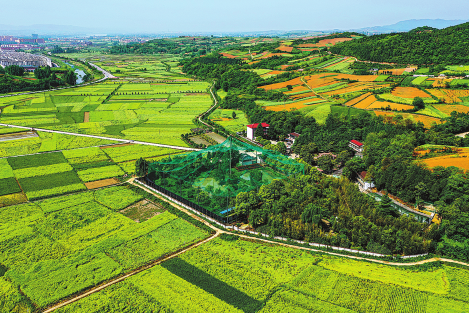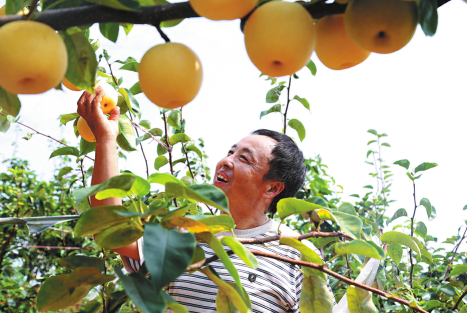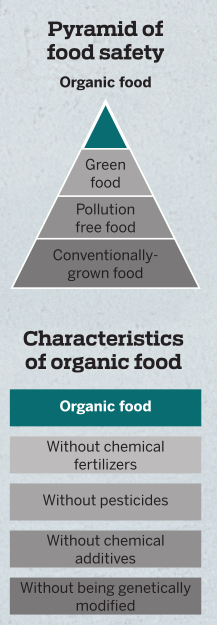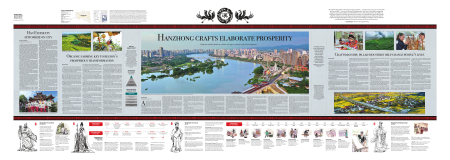
The picturesque rice fields in Yangxian county, Hanzhong.

A farmer picks a golden pear at an orchard in Caoba village, Yangxian county.

Organic farming has become a calling card for Yangxian county in Northwest China's Shaanxi province. Organic farming's fame in the county is just like the crested ibis, a bird species under the national Level-I protection, the highest in China.
In 1981, Yangxian, which is located in the province's Hanzhong city, reported seven wild crested ibises, the world's only known wild population of the birds at the time. The bird, known as "the oriental gem", was once thought to be extinct as a result of human activities such as urbanization and pollution.
Since then, the local government has worked to protect the endangered species by stopping commercial logging and certain exploitation activities while also tightening restrictions on the use of chemical fertilizers and pesticides.
The protection methods have increased the bird's population to several thousands, but also restrained the county's industrial and agricultural development.
In 2005, the county government launched a targeted poverty-relief project by developing organic farming to help residents increase their incomes.
In 2010, it constructed one of the largest organic industrial parks in Northwest China and issued a series of preferential policies to encourage companies and cooperatives to take part in the development of organic agriculture.
In 2015, the county was listed among China's first group of demonstration zones for the certification of organic farm products.
In 2019, it was approved by the Ministry of Agriculture and Rural Affairs as a national green agricultural development pilot zone.
By the end of 2019, Yangxian was home to 30 companies engaging in organic agriculture. It also boasted 81 kinds of certificated organic products in 15 categories, with total annual output reaching nearly 37,000 metric tons.
Related output value stood at 1.1 billion yuan ($169.9 million) in 2019, accounting for 20 percent of the county's gross output value of agriculture.
The industry has not only maintained a suitable living environment for crested ibises, but also helped the county solve the contradiction between ecological protection and regional economic development, local officials said.
In 2019, 68 villages and 18,700 people in Yangxian rose above the poverty line, which can largely be attributed to the growth in organic agriculture.
The village of Caoba, for example, has become a model for developing organic agriculture in the county and is famous for its distinct green agricultural products like black rice, golden pears and rapeseed oil.
Located inside the Yangxian national crested ibis natural reserve, the village has banned the use of pesticides and fertilizers for decades, and resorted to pollution-free technologies such as solar insecticidal lights and sticky traps for pest control.
In 2009, the village founded a specialized farmers' cooperative to integrate land and labor resources while also providing training, production materials and services of procurement, processing and marketing to farmers.
"Caoba now has more than 4,000 mu, or 267 hectares, of land used to plant golden pear trees and 1,000 mu of paddies to grow rice," said Liu Yuhua, Party secretary of Caoba.
"Following technical standards for organic agricultural production, they have all passed the national certification for organic products and are very popular among customers.
"We have also developed pear and rice production bases in neighboring villages because the output in our village cannot meet market demand," he added. "For example, nearly all the golden pears are ordered every year, even before they reach maturity."
In 2018 and 2019, Caoba had led 21 villages in Yangxian to plant more than 6,000 mu of black rice.
"We provide seeds, organic fertilizers and technical services, and purchase the rice at a price which is 30 percent higher than the market average," Liu said.
Such made-to-order farming is the main development model used by organic agriculture companies and cooperatives in Yangxian. It effectively links farming with distribution and sales, which is more scientific than market-driven planting plans, experts said.
Kangyuan Ecological Agriculture, a leading company in the sector in Yangxian, for example, developed over 1,000 mu of organic rice planting bases in four villages last year.
The company mainly engaged in planting sweet potatoes and producing sweet potato noodles when it was first established in 2010. It started its organic rice planting and processing business in 2016.
In 2019, the company planted 2,500 mu of organic sweet potatoes and produced 1,000 tons of noodles. It also grew 1,700 mu of rice.
"Most of them are made-to-order farming. We only own about 200 mu of farmland, which is mainly used for breeding cultivation and experimenting," said Chang Hongzhu, the company's general manager.
Kangyuan developed two new varieties of high-quality sweet potatoes several years ago. About 95 percent of sweet potatoes planted in Yangxian are from these two varieties, Chang said.
After 15 years of development, organic farming has not only become a core of economic and social development in Yangxian, but also played a vital role in local poverty alleviation. In 2019, the county allocated 20 million yuan of special funding to encourage farmers to grow black rice.
Black rice can be used to make tea, cereal and vinegar, which are characteristic products in Yangxian.
Daxiande Condiments, a time-honored company in the county, specializes in producing seasonings such as vinegar and soy sauce that are organic. The Daxiande brand dates back to the 1850s.
"We use locally grown organic crops like black rice and soybeans as materials, and the air and water in our production zones also meet the national standards for organic production," said Yan Hantao, general manager of the company.
What is organic food?
The term "organic food" refers to use of natural organic methods in the process of crop cultivation, which is realized by using the natural farming methods. Chemical fertilizers, pesticides and growth regulators must not be used during the entire process. The fertilizers used in growing organic food must be organic, and there are strict requirements for the land, so there is zero pollution.

